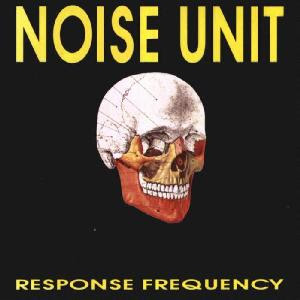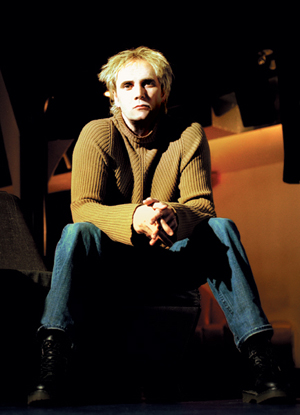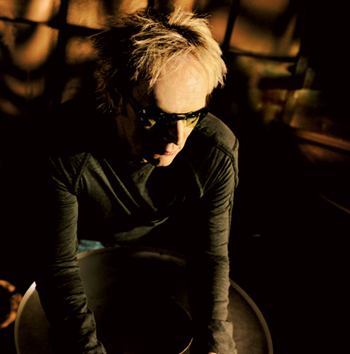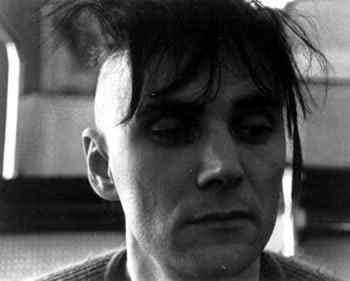
Noise Unit is one of the many side projects from Bill Leeb, most notably known for his work in Front Line Assembly. Noise Unit first appeared in 1989 when Bill Leeb got together with Klinik's Marc Verhaeghen to release the currently unavailable Grinding into Emptiness, which was released as part of Wax Trax's industrial domination of the late eighties. Rhys Fulber joined the act in 1990, and this trio released Response Frequency, which appeared in this country as an import on the Antler-Subway, another highly influential label during the early years of the modern industrial age.



When Klinik began going through its various permutations, Marc Verhaeghen was called away and Noise Unit was trimmed down to Leeb and Fulber, making Noise Unit one of four bands comprised of this productive pair (the other three being Front Line, Delerium, and Intermix). The first release from the Noise duo was 1992's Strategy of Violence, which came out on Germany's Dossier Records.


Up until now, the Noise Unit sound was very similar to the style embraced by the mother band, Front Line Assembly: harsh caustic electronic music empowered with a steady dance beat. With the group's fourth album came a stylistic change. Decoder was released on Dossier in 1995, and gained a North American release on Cleopatra Records in 1996. This record was very energetic and filled with the light-spirited energy of the trance movement, the bubbling sequential percolations of such seminal performers as Tangerine Dream and Klaus Schulze, yet maintaining the aggressiveness that continues to define the industrial movement. The record was at once much more accessible than their previous work, yet compromised none of their musical integrity.



For 1997 Noise Unit's fifth album Drill, marked the first time since 1990 that Marc Verhaeghen has worked with the band since the early 90s, and it also featured input from the members of Haujobb. Drill was the first Noise Unit release licensed by Metropolis Records, although Leeb is no stranger to Metropolis as Front Line Assembly has been licensed since 1995. During the past 8 years, the members of Noise Unit have been busy working on their other projects. In late 2004, Bill Leeb got together with Chris Peterson (another member of Front Line Assembly and Decree) to revive the Noise Unit project. Their efforts paid off and a new album will appear in 2005. The aptly titled Voyeur, features spacious atmospheric melodies layered with flowing strings, whispered vocals, electronic noises and mutilations, along side bass-lines that range from a drum n' bass vibe to an aggressive industrial assault.

One can feel themselves peering into the lives and minds of other people and worlds while listening to the sonic anomaly. Perhaps the best album from a FLA side-project since Delerium's Karma, Voyeur is sure to please fans of Front Line Assembly and Delerium, as well as all of those in between. Noise Unit was the name given one of the numerous industrial projects of Bill Leeb and Rhys Fulber, who together also helmed Front Line Assembly, Intermix, and Synaesthesia. The first Noise Unit record, Grinding Into Emptiness, bowed in 1990, followed by Response Frequency. Strategy of Violence appeared in 1995. In 1996, the group issued Decoder; Drill appeared a year later.



Trent Reznor and Alain Jorgensen usually get all the credit for popularizing industrial rock with a hard edge, but there were others who contributed to the genre while it was still taking shape in the late 80s, such as Frontline Assembly's Rhys Fulber. Born and raised in Vancouver, British Columbia, Fulber's appreciation of music began at an early age, thanks in large part to his musician father, who had various instruments strewn throughout the house. By the age of six, Fulber was playing the drums, and five years later, was already visiting recording studios and discovering punk rock and new wave artists (namely the Dead Kennedys and Pete Shelley's 1981 release, Homosapien). It was Shelley's work in particular that led to Fulber's father purchasing his young son a drum machine and synthesizer. Shortly thereafter, Fulber met another local like-minded musician, Austrian Bill Leeb, which would result in a long and fruitful musical union. The duo initially worked under the alias of Wilhelm Schroeder on the 1984 Skinny Puppy EP, Remission, before launching their own industrial outfit, Frontline Assembly.

The group would go on to issue countless releases on a steady basis (including such standouts as 1989's Gashed Senses and Crossfire, 1992's Tactical Neural Implant, and 1999's Implode, among others), but Fulber would find time for other projects as well. Tops on the list was a new age-like ambient side project that Fulber collaborated on with Leeb, Delerium (a group that has nearly matched Frontline Assembly's staggering among of releases), who is best known for their 1997 global hit, Silence," which featured vocals by Sarah McLachlan, and rocketed to the top of the charts throughout Europe. The 90s saw Fulber collaborate further with Leeb on a pair of short lived projects, Intermix and Synaesthesia, the former existing from 1992 - 1995, while the latter from 1995 - 1997. Additionally, Fulber has been closely linked with industrial-metallists Fear Factory (supplying production, programming, keyboards, and arrangements to such popular albums as 1995's Demanufacture and 1998's Obsolete, among others), and worked with such varied artists as Josh Groban, Megadeth, P.O.D., Mudvayne, the Tea Party, and even prog rock veterans Yes (!).

Known for his work in the aggressive industrial outfit Front Line Assembly and the ethnic/ambient project Delerium, Bill Leeb was born in Austria and emigrated to Vancouver, Canada, with his family around age 12. He joined the charter lineup of the seminal industrial band Skinny Puppy under the alias Wilhelm Schroeder, then left in 1986 to form Front Line Assembly with sampler/programmer Rhys Fulber and synth player Michael Balch (the latter left in 1990).

FLA maintained a prolific recording pace over the next decade, turning out groundbreaking albums like Caustic Grip (1991), Tactical Neural Implant (1992), and the guitar-oriented Millennium (1994) that helped industrial music cross over to alternative audiences. In the meantime, Leeb and Fulber started a quieter, more meditative side project called Delerium, which made some recordings for a small German label during the late '80s and early '90s. A higher-profile, guest-heavy Delerium album, Karma, was released in 1997 and produced an international hit single in "Silence," which followed in the vein of ethnic fusion artists like Dead Can Dance, Enigma, and Deep Forest.

The album sold well on the new age charts, and its dark, haunting quality earned Delerium a substantial cult following, which continued on 2001's Poem, another internationally popular release. In the meantime, Fulber departed to concentrate on his producing career, and was replaced by Chris Peterson; Leeb's various other side projects with Fulber, including Intermix and Noise Unit, fell by the wayside as the new teaming with Peterson took shape: Pro-Tech and the drum'n'bass-flavored Equinox. Leeb offered a new Delerium project, Chimera, in 2003.
Noise Unit is one of the many side projects from Bill Leeb, most notably known for his work in Front Line Assembly. Noise Unit first appeared in 1989 when Bill Leeb got together with Klinik's Marc Verhaeghen to release the currently unavailable Grinding into Emptiness, which was released as part of Wax Trax's industrial domination of the late eighties. Rhys Fulber joined the act in 1990, and this trio released Response Frequency, which appeared in this country as an import on the Antler-Subway, another highly influential label during the early years of the modern industrial age.
When Klinik began going through its various permutations, Marc Verhaeghen was called away and Noise Unit was trimmed down to Leeb and Fulber, making Noise Unit one of four bands comprised of this productive pair (the other three being Front Line, Delerium, and Intermix). The first release from the Noise duo was 1992's Strategy of Violence, which came out on Germany's Dossier Records.
Up until now, the Noise Unit sound was very similar to the style embraced by the mother band, Front Line Assembly: harsh caustic electronic music empowered with a steady dance beat. With the group's fourth album came a stylistic change. Decoder was released on Dossier in 1995, and gained a North American release on Cleopatra Records in 1996. This record was very energetic and filled with the light-spirited energy of the trance movement, the bubbling sequential percolations of such seminal performers as Tangerine Dream and Klaus Schulze, yet maintaining the aggressiveness that continues to define the industrial movement. The record was at once much more accessible than their previous work, yet compromised none of their musical integrity.
For 1997 Noise Unit's fifth album Drill, marked the first time since 1990 that Marc Verhaeghen has worked with the band since the early 90s, and it also featured input from the members of Haujobb. Drill was the first Noise Unit release licensed by Metropolis Records, although Leeb is no stranger to Metropolis as Front Line Assembly has been licensed since 1995. During the past 8 years, the members of Noise Unit have been busy working on their other projects. In late 2004, Bill Leeb got together with Chris Peterson (another member of Front Line Assembly and Decree) to revive the Noise Unit project. Their efforts paid off and a new album will appear in 2005. The aptly titled Voyeur, features spacious atmospheric melodies layered with flowing strings, whispered vocals, electronic noises and mutilations, along side bass-lines that range from a drum n' bass vibe to an aggressive industrial assault.
One can feel themselves peering into the lives and minds of other people and worlds while listening to the sonic anomaly. Perhaps the best album from a FLA side-project since Delerium's Karma, Voyeur is sure to please fans of Front Line Assembly and Delerium, as well as all of those in between. Noise Unit was the name given one of the numerous industrial projects of Bill Leeb and Rhys Fulber, who together also helmed Front Line Assembly, Intermix, and Synaesthesia. The first Noise Unit record, Grinding Into Emptiness, bowed in 1990, followed by Response Frequency. Strategy of Violence appeared in 1995. In 1996, the group issued Decoder; Drill appeared a year later.
Trent Reznor and Alain Jorgensen usually get all the credit for popularizing industrial rock with a hard edge, but there were others who contributed to the genre while it was still taking shape in the late 80s, such as Frontline Assembly's Rhys Fulber. Born and raised in Vancouver, British Columbia, Fulber's appreciation of music began at an early age, thanks in large part to his musician father, who had various instruments strewn throughout the house. By the age of six, Fulber was playing the drums, and five years later, was already visiting recording studios and discovering punk rock and new wave artists (namely the Dead Kennedys and Pete Shelley's 1981 release, Homosapien). It was Shelley's work in particular that led to Fulber's father purchasing his young son a drum machine and synthesizer. Shortly thereafter, Fulber met another local like-minded musician, Austrian Bill Leeb, which would result in a long and fruitful musical union. The duo initially worked under the alias of Wilhelm Schroeder on the 1984 Skinny Puppy EP, Remission, before launching their own industrial outfit, Frontline Assembly.
The group would go on to issue countless releases on a steady basis (including such standouts as 1989's Gashed Senses and Crossfire, 1992's Tactical Neural Implant, and 1999's Implode, among others), but Fulber would find time for other projects as well. Tops on the list was a new age-like ambient side project that Fulber collaborated on with Leeb, Delerium (a group that has nearly matched Frontline Assembly's staggering among of releases), who is best known for their 1997 global hit, Silence," which featured vocals by Sarah McLachlan, and rocketed to the top of the charts throughout Europe. The 90s saw Fulber collaborate further with Leeb on a pair of short lived projects, Intermix and Synaesthesia, the former existing from 1992 - 1995, while the latter from 1995 - 1997. Additionally, Fulber has been closely linked with industrial-metallists Fear Factory (supplying production, programming, keyboards, and arrangements to such popular albums as 1995's Demanufacture and 1998's Obsolete, among others), and worked with such varied artists as Josh Groban, Megadeth, P.O.D., Mudvayne, the Tea Party, and even prog rock veterans Yes (!).
Known for his work in the aggressive industrial outfit Front Line Assembly and the ethnic/ambient project Delerium, Bill Leeb was born in Austria and emigrated to Vancouver, Canada, with his family around age 12. He joined the charter lineup of the seminal industrial band Skinny Puppy under the alias Wilhelm Schroeder, then left in 1986 to form Front Line Assembly with sampler/programmer Rhys Fulber and synth player Michael Balch (the latter left in 1990).
FLA maintained a prolific recording pace over the next decade, turning out groundbreaking albums like Caustic Grip (1991), Tactical Neural Implant (1992), and the guitar-oriented Millennium (1994) that helped industrial music cross over to alternative audiences. In the meantime, Leeb and Fulber started a quieter, more meditative side project called Delerium, which made some recordings for a small German label during the late '80s and early '90s. A higher-profile, guest-heavy Delerium album, Karma, was released in 1997 and produced an international hit single in "Silence," which followed in the vein of ethnic fusion artists like Dead Can Dance, Enigma, and Deep Forest.
The album sold well on the new age charts, and its dark, haunting quality earned Delerium a substantial cult following, which continued on 2001's Poem, another internationally popular release. In the meantime, Fulber departed to concentrate on his producing career, and was replaced by Chris Peterson; Leeb's various other side projects with Fulber, including Intermix and Noise Unit, fell by the wayside as the new teaming with Peterson took shape: Pro-Tech and the drum'n'bass-flavored Equinox. Leeb offered a new Delerium project, Chimera, in 2003.
[Releted links]















Post a Comment